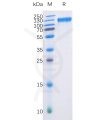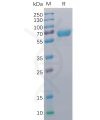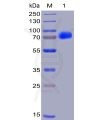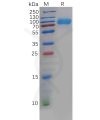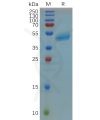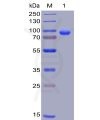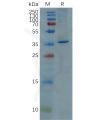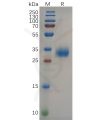| Target | |
|---|---|
| Synonyms | C-C Motif Chemokine 16;Chemokine CC-4;HCC-4;Chemokine LEC;IL-10-Inducible Chemokine;LCC-1;Liver-Expressed Chemokine;Lymphocyte and Monocyte Chemoattractant;LMC;Monotactin-1;MTN-1;NCC-4;Small-Inducible Cytokine A16;CCL16;ILINCK;NCC4;SCYA16 |
| Description | Recombinant Human C-C Motif Chemokine 16 is produced by our E.coli expression system and the target gene encoding Gln24-Gln120 is expressed. |
| Delivery | Under development |
| Uniprot ID | O15467 |
| Expression Host | E.coli |
| Molecular Characterization | Not available |
| Molecular Weight | 11 KDa |
| Purity | The purity of the protein is greater than 95% as determined by SDS-PAGE and Coomassie blue staining. |
| Formulation & Reconstitution | Lyophilized from a 0.2 μm filtered solution of 20mM PB, 150mM NaCl, pH 7.4. |
| Storage&Shipping | Store at -20°C to -80°C for 12 months in lyophilized form. After reconstitution, if not intended for use within a month, aliquot and store at -80°C (Avoid repeated freezing and thawing). Lyophilized proteins are shipped at ambient temperature. |
| Background | CCL16 is a member of CC chemokine family. CCL16 cDNA encodes a 120 amino acid peptide along with a 23 amino acids signal peptide that is cleaved to generate 97 amino acid protein. CCL16 is distantly related to other CC chemokines, showing less than 30% sequence identity. CCL16 elicits its effects on cells by interacting with cell surface chemokine receptors such as CCR1, CCR2, CCR5 and CCR8. Recombinant CCL16 has been shown to chemoattract human monocytes and THP1 cells but not resting lymphocytes nor neutrophils. CCL16 has potent myelosuppressive activity, suppresses proliferation of myeloid progenitor cells. CCL16ninduces a calcium flux in THP1 cells that can be desensitized by prior exposure to RANTES, suggesting that CCL16 and RANTES share the same receptor in THP1 cells. |
| Usage | Research use only |
| Conjugate | Unconjugated |

Human CCL16 Protein
Price: 50 μg $400.00
Product Data Dima FAQ
Images Dima FAQ
Related Products
ECD Proteins
SKU: PME100007 Target: FLT3 Tag: C-Human Fc and 6×His Tag
Price: 10μg $82.00; 50μg $320.00 ; 100 μg $480.00
ECD Proteins
SKU: PME100016 Target: CD48 Tag: C-Mouse Fc and 6×His Tag
Price: 10μg $91.00; 50μg $348.00 ; 100 μg $522.00
ECD Proteins
SKU: PME100002 Target: CS1 Tag: C-Human Fc and 6×His Tag
Price: 10μg $82.00; 50μg $320.00 ; 100 μg $480.00
ECD Proteins
SKU: PME100012 Target: B7-H3 Tag: C-Mouse Fc and 6×His Tag
Price: 10μg $82.00; 50μg $320.00 ; 100 μg $480.00
ECD Proteins
SKU: PME100671 Target: RSPO3 Tag: C-Human Fc Tag
Price: 10μg $72.00; 50μg $274.00 ; 100 μg $411.00
ECD Proteins
SKU: PME100018 Target: GITR Tag: C-Human Fc and 6×His Tag
Price: 10μg $96.00; 50μg $370.00 ; 100 μg $555.00
ECD Proteins
SKU: PME100006 Target: CD138 Tag: C-Human Fc and 6×His Tag
Price: 10μg $82.00; 50μg $320.00 ; 100 μg $480.00
ECD Proteins
SKU: PME100667 Target: GFAP Tag: N-6×His Tag
Price: 10μg $72.00; 50μg $274.00 ; 100 μg $411.00
ECD Proteins
SKU: PME100647 Target: S protein RBD Tag: C-6×His Tag
Price: 10μg $72.00; 50μg $272.00; 100μg $409.00

